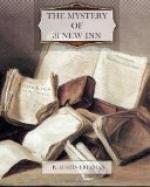“That was what I gathered,” said I.
Marchmont gazed at us for a moment with a surprised expression and then, laughing good-humouredly, fortified himself with a draught of ale.
“The moral of which is,” Thorndyke added, “that testamentary dispositions should not be mixed up with beef-steak pudding.”
“I believe you’re right, Thorndyke,” said the unabashed solicitor. “Business is business and eating is eating. We had better talk over our case in my office or your chambers after lunch.”
“Yes,” said Thorndyke, “come over to the Temple with me and I will give you a cup of coffee to clear your brain. Are there any documents?”
“I have all the papers here in my bag,” replied Marchmont; and the conversation—such conversation as is possible “when beards wag all” over the festive board—drifted into other channels.
As soon as the meal was finished and the reckoning paid, we trooped out of Wine Office Court, and, insinuating ourselves through the line of empty hansoms that, in those days, crawled in a continuous procession on either side of Fleet Street, betook ourselves by way of Mitre Court to King’s Bench Walk. There, when the coffee had been requisitioned and our chairs drawn up around the fire, Mr. Marchmont unloaded from his bag a portentous bundle of papers, and we addressed ourselves to the business in hand.
“Now,” said Marchmont, “let me repeat what I said before. Legally speaking, we have no case—not the ghost of one. But my client wished to take your opinion, and I agreed on the bare chance that you might detect some point that we had overlooked. I don’t think you will, for we have gone into the case very thoroughly, but still, there is the infinitesimal chance and we may as well take it. Would you like to read the two wills, or shall I first explain the circumstances?”
“I think,” replied Thorndyke, “a narrative of the events in the order of their occurrence would be most helpful. I should like to know as much as possible about the testator before I examine the documents.”
“Very well,” said Marchmont. “Then I will begin with a recital of the circumstances, which, briefly stated, are these: My client, Stephen Blackmore, is the son of Mr. Edward Blackmore, deceased. Edward Blackmore had two brothers who survived him, John, the elder, and Jeffrey, the younger. Jeffrey is the testator in this case.
“Some two years ago, Jeffrey Blackmore executed a will by which he made his nephew Stephen his executor and sole legatee; and a few months later he added a codicil giving two hundred and fifty pounds to his brother John.”
“What was the value of the estate?” Thorndyke asked.




